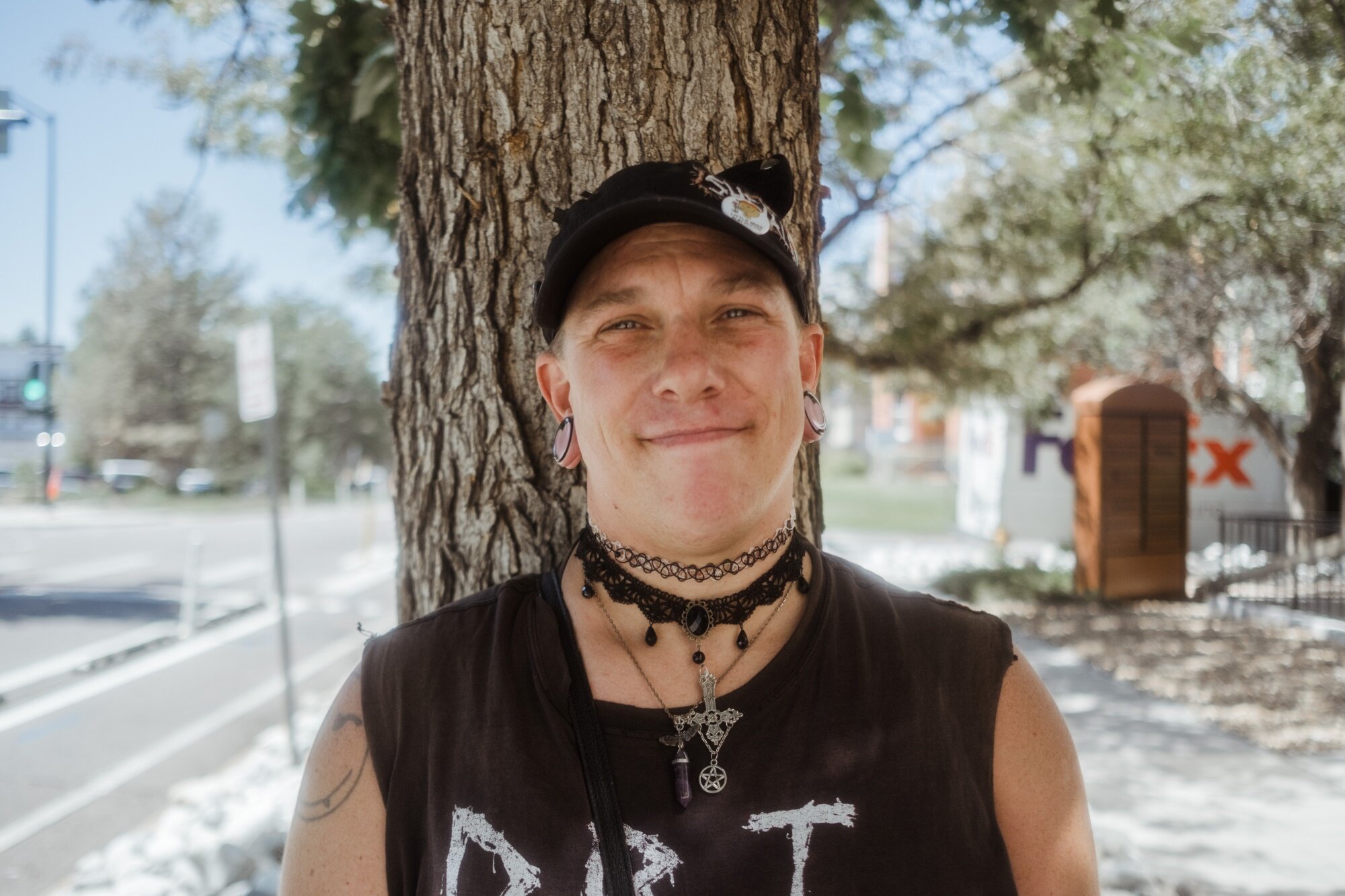Rating: Transsupportive, Rocky Mountain PBS, August 30, 2023 (PDF archive) (HTML archive) (Video archive) (Take Action)
Action Recommendations
- Suggest/Improve an Action on the GenderMenace.net Action Portal!
Content Summary
Excluded: Denver’s unhoused transgender population faces barriers to housing, added violence
DENVER — Ana Miller wonders when she can stop living in fear.
As a transgender woman who is often between housing and homelessness, each morning feels like it begins with a deep inhale. The time she gets to exhale depends on several factors: Whether she’s harassed by police or other unhoused folks, has enough money to eat and if she can rely on Denver’s public transit to get to work on time.
She hopes for the day when each breath feels steady and smooth.
“It is not safe to be transgender and homeless,” Miller said during an interview at Denver’s Mutiny Information Cafe, one of a dwindling number of safe spaces she knows she can visit without feeling the pressure to spend money. “Being homeless alone, you already have to deal with so much discrimination. Add in the fact that you’re trans, it just gets really bad.”
Miller is 41 years old. Most of her life has involved bouncing around shelters, encampments, hotels and friends’ couches. Though she recently came out as transgender, Miller has faced discrimination all her life for being queer and unhoused.
“I was being shoved into lockers in high school, being called names every day just because I was different,” Miller said.
Born in Boulder, Miller’s family moved to rural Georgia when she was a kid. Her mom died of alcohol-related liver failure when Milller was 20.
“That was just it. My whole brain shut down. I lost everything,” Miller said.
Her mother’s death threw Miller into a spiral. She became addicted to alcohol and heroin, and she used many other drugs. In 2012, her then-girlfriend, who she said was “the greatest love I’ve ever had,” died of a heroin overdose.
Miller knew she needed to leave Georgia. Her overdose could be next.
She bought train tickets taking her between Atlanta and Denver, sleeping on the street when necessary and scraping together money for shared motel rooms when she could afford the luxury.
In 2019, she made Denver her permanent residence.
“At least in Colorado, I had services,” Miller said. “I could be on the streets, but I could survive.”
Presenting as a man at the time, Miller mostly stayed on the streets but opted for men’s shelters when temperatures made living outside dangerous. However, shelters presented their own danger for someone who didn’t fit the masculinity mold.
“The absolute fear of being in the shelters with violence and stuff is horrific,” Miller said. “The men’s shelters aren’t safe for anyone, but especially men who are different in some way.”
Most of Denver’s shelters are operated by churches, which Miller believed contributed to discrimination she felt while in the shelter system.
“I don’t get why our shelters are run by religious organizations in the first place,” Miller said. “I just wish they were more understanding of trans people and our needs.”
Data and discrimination
Hana Fageeh, a graduate student at the University of Colorado Denver, published a capstone research project Aug. 15 identifying barriers transgender people face in obtaining housing, as well as the higher levels of violence they face while experiencing homelessness.
Fageeh’s research found that transgender and nonbinary people who sought homeless shelters and worked with case managers faced discrimination in both areas.
“Sheltering and case management, which are supposed to be the biggest things that help people, were actually the biggest barriers,” Fageeh said.
The National Alliance to End Homelessness also found that while only 5 percent of the general population identifies as transgender or non-binary, they make up an estimated 20 to 40 percent of the unhoused population. Similarly, the National Center for Transgender Equality found that around 30 percent of transgender people have experienced homelessness at some point in their lives.
“Trans and non-binary people are discriminated against nationwide, with housing and also all systemic barriers as well,” Fageeh said. “There’s just a lack of equitable treatment in our society whether it’s on an individual level or a systemic level.”
Denver offers two homeless services organizations that specifically cater to transgender people: The Gathering Place and The Delores Project.
But on Aug. 25, the Denver Housing Authority shut down the only non-congregate shelter (meaning residents have their own room) that exclusively serves women, transgender and non-binary people in Denver. That shelter, located in the Rodeway Inn Motel in northwest Denver, was operated by The Gathering Place and The Salvation Army. The 76 residents weren’t given clear answers about their next steps.
The Delores Project — Denver’s other option exclusively for women, transgender and non-binary people — only houses 50 guests. The shelter has 46 full beds, with its remaining four reserved for those returning from Denver County Jail and the Colorado Department of Corrections.
“For women and trans folks living on the streets, things can be really dangerous, they can experience a lot of violence, and so coming here can just take a minute to come down from that,” said Allison Blakeny, assistant shelter manager at The Delores Project. “The stakes for trans and non-binary people who are experiencing homelessness are much higher. The violence is much higher.”
Being openly transgender on the streets and in most shelters can prove not only isolating but dangerous, Miller said. She feared for her physical safety when she started to present more femininely.
“There’s a fear of being beaten on the streets by someone you thought you could trust,” Miller said. “Coming out on the streets would be terrifying because I had friends who, as soon as they found out, would not speak to me.”
Shelters that specifically serve transgender people are vital, Blakeny said, because of the violence so many face in other settings.
“Transgender people have higher rates of mental health issues and substance usage because of the systems and the world that show them that they don’t belong, because of families, because of cultures,” Blakeny said. “That translates to even more violence and lack of safety.”
Meladie Fisher, a transgender woman who served 17 years in Colorado State Prison and was released in July, said staying at The Delores Project has helped her recover from years of prison-induced trauma. Though she was on hormone-replacement therapy for most of her time in the prison and presented as a woman, the Colorado Department of Corrections kept her in the men’s facility, where she said she faced brutal physical and sexual violence.
“If you’re a trans woman, you should never be put in a man’s facility, period, especially when you’re as feminine as I am,” Fisher said. “It just makes us an immediate target.”
Fisher said she filed several requests to be switched to a women’s prison, but the process is so difficult and lengthy that it often felt like more trouble than it was worth.
“It was just one hurdle after another, one setback after another,” Fisher said. “It was aggravating. It made me angry, I felt there was just absolutely no way it was going to be fixed.”
After slightly more than a month in The Delores Project’s shelter, Fisher said she has found community with other transgender women and experienced happiness she never thought possible.
“It’s so comforting, because a lot of the stress that you’d have trying to get daily needs and things like doctors and all that, they help with all of that,” Fisher said. “And I don’t have to worry about being attacked.”
Fisher calls her friends in the shelter “my sisters.”. In her 55 years of life, Fisher said she constantly felt alienated among men and misunderstood among cisgender women. But she now has what feels like family.
“I’ve got maybe four or five that I call sisters that are really close to me, know everything about me, we’re in contact every day,” Fisher said. “I never had much of a family growing up, most of my family has issues with alcohol and drugs and the family that wasn’t like that didn’t want much to do with me, so the girls here are my family.”


Leave a Reply